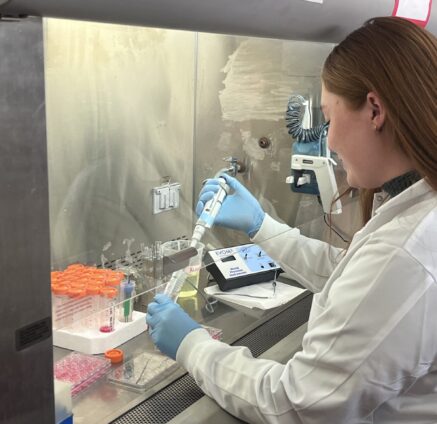Making the Most of a Pharmaceutical Company Internship
November 4, 2024Internships at pharma companies provide hands-on experience in industry, while allowing for unmatched networking opportunities. In this blog, two of our awardees share about their summer internship experiences.
In 2023, nearly 62% of biomedical scientists had an industry job lined up after graduation, according to a National Science Foundation survey of new PhD graduates. Given the increasingly competitive job market, current graduate students may be pondering how to get their foot in the door of the pharmaceutical industry.
Internships at pharma companies provide hands-on experience in industry, while allowing for unmatched networking opportunities. The PhRMA Foundation interviewed two of our 2024 predoctoral awardees about their summer internship experiences and their advice for other students.
Madison Davis, a PhD candidate in molecular pharmaceutics and drug delivery at the University of Texas at Austin, thought a career in industry might be a good fit for her, but she wanted to get real-world experience before committing to that path.
“I wanted to see what industry was actually like, see what kinds of jobs there are,” said Davis, who interned at Merck this summer. “There are thousands of jobs within a single company. As an intern, you kind of get a free card to talk to anybody and everybody, so I tried to do that as much as I could and see what jobs I might like and what jobs maybe I wouldn’t be a good candidate for and narrowing it down to what I want to apply for in the future.”
Xiyin Wang, MS, a PhD candidate at the Mayo Clinic Graduate School of Biomedical Sciences, interned at Neurocrine Biosciences, which focuses on developing therapies for neurological disorders. He recommended that grad students apply for multiple internships. “The more applications you submit, the higher your chances of landing an opportunity that aligns with your interests and career goals,” he said.
Both Wang and Davis emphasized the importance of networking in both applying for internships and during the internship itself. They suggested connecting and messaging with hiring managers and other company professionals on LinkedIn. “Building these connections can provide you with valuable insights and might even give you a leg up in the hiring process,” Wang said. “Be proactive and don’t be shy about reaching out.”
Davis advised students to discuss their desire to do an internship with their PI well ahead of time (she planned over a year in advance) and ask them to make connections for informational interviews with people they know at companies. For guidance on informational interviewing, watch the PhF webinar “Mastering the Art of Networking.”
She estimated that during her internship she spent 60% of her time on science and 40% on networking. She scheduled lunches and meetings with directors and hiring managers in areas across the company. “If you are interested in potentially getting a job one day, make sure they know who you are,” Davis said. “I used to not take networking so seriously, but after this summer, I realized how important it is to be very personable with people — it’s not just a transaction.”
Wang said the best part of his internship were the one-on-one networking meetings. “Engaging directly with these experts was not only enlightening but also inspiring, as I was able to ask questions, seek advice, and understand the career paths they took to get where they are today,” he said.
One challenge of industry internships is transitioning from grad school to a fast-paced company setting. “Unlike academic research, where timelines can be more flexible, the pharmaceutical industry operates on strict schedules and rapid project timelines,” Wang said. “I had to quickly learn to prioritize tasks, manage my time effectively, and adapt to changes in project direction based on team feedback and emerging data.”
Davis joked that while working only 40 hours a week was “really nice compared to grad school,” the company environment necessitates professionalism and mindfulness of colleagues’ schedules and working hours. To learn more about what it’s like to work at a pharmaceutical company, watch the PhF webinar “Transitioning From Academia to Industry.”
In their day-to-day work, Davis and Wang performed experiments, learned new research techniques, analyzed data, and met with their teams and mentors. At the end of her internship, Davis gave a final presentation on her work. “Everyone showed so much interest in what I had accomplished over the summer,” she said. “You spend those hours in the lab, and it doesn’t go unnoticed. It was really rewarding.”
Both awardees highly recommended a pharmaceutical company internship experience and are considering future careers in industry.
“It made me want to go into the industry even more,” Davis said. “I know for certain that’s the impact I want to have, that’s the job I want to have. I want a career where hopefully I am lucky enough to take a product all the way through clinical trial and get it on the market. That is incredibly motivating.”
Wang’s internship experience significantly changed his perspective on the pharmaceutical industry and taught him much about the complexities of drug development. “This experience provides valuable insights into real-world applications of scientific research, enhances understanding of industry practices, and fosters professional networking,” he said. “The hands-on experience is essential for developing skills that are directly applicable to a future career in biopharma.”
For those who have already completed their PhD, learn about postdoctoral opportunities at pharmaceutical companies in the PhF “Exploring Career Paths” webinar series.
